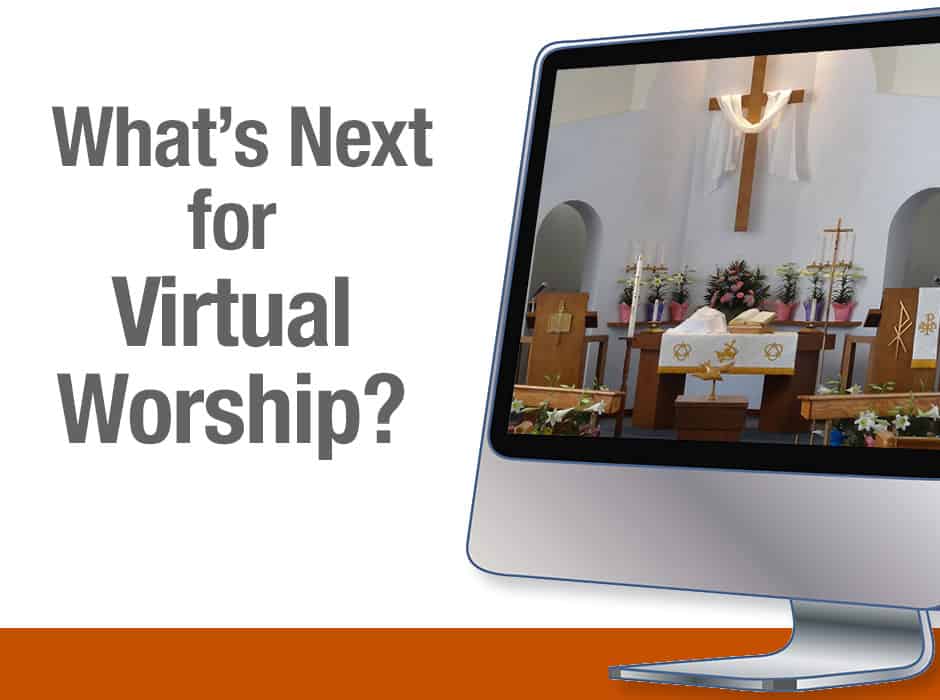What’s Next for Virtual Worship?

It’s the new buzzword in Christianity and I hate it: Virtual Worship. Virtual can mean “online” in a modern context, but in its more traditional sense it means “almost” or “kind of like.” I buy a used car and say “It’s virtually brand new!” It’s not, but it could be. And so, I refuse to use the term virtual worship. What we are celebrating is real, authentic worship of a real, authentic God. We are doing it in diaspora, but that makes it no less heartfelt nor our sacraments less valid. We are not virtually anything! The church is gathered in the safest way it can be and we are being the Body of Christ!
But there is a problem: We have new folks joining us online! People from other states and even a few from other countries, mainly those who are drawn to an affirming, progressive message and don’t have that where they live. And these new folks are not just worshiping on Sundays … they’re joining book clubs and Bible studies, too. They are even sending financial support! These are indeed good problems to have, but they present us with a new challenge: As vaccines roll out and our hopes of coming together again move closer to reality, what will it look like to move “virtual worship” (still hating that term, by the way) back into authentic community?
We cannot simply go back to in-house worship as it was before. There are people who will now be left behind, and that is not acceptable. We must think about creating a new community that includes those who can’t be with us physically. That means merging live stream with in-person gatherings in whatever way we can. For us, we bought a video camera and table mic and the needed hardware so that we can incorporate Zoom into all our church activities. It’s not perfect, but we are working now to figure it out so we’ll be ready when gathering becomes feasible again. Every small group, every committee meeting will be open to those who can only participate online.
But that’s the simple part. It’s also going to mean rethinking our understanding of the Holy Spirit with regard to our sacramental theology. I’m not entirely comfortable with people gathering around a computer with their own bread and cup for communion. I guess I’m just old school. But do I expect someone who worships online to live a spiritual life devoid of sacramental grace? I have a young mother who has rediscovered her faith with us but lives in another state. She wants to baptize her two young children. Even though the ordinary minister of baptism is the ordained clergy, technically, any baptized Christian can baptize. Can this be done on a Sunday morning in worship via Zoom with the gathered community praying the prayers and the mother administering the water on behalf of the gathered community? What about confirmations? What will it look like to receive new members on a Sunday morning with three people at the altar rail and one person on a screen from their living room? At the core of our exploration is this question: Can the Holy Spirit be bigger than our traditional understanding of community?
I don’t have the answers and I’m not a fan of “loosey goosey” sacramental theology that throws out all serious consideration of tradition and ritual. But what I am realizing is that I have to wrestle with these questions now, while there is still time. God is calling me to stretch my comfort zone in new ways for the good of my people. What will authentic community look like post-Covid? I admit I do not know. But I do know that it can’t look the same as it did before. This can be a devastating time in our church’s story, or it can be a new reformation if we allow it to be. Let’s listen to the Spirit speaking to the church and find new ways to move into a fuller and more inclusive sense of what it means to be authentic community.
For even more material: Start your membership to HomileticsOnline.com for unlimited downloads of thousands of sermon inspiration, worship resources, commentary, children’s sermons and more.
Share this Post:
Looking for More?
Imagine having fresh help in preparing your sermons right at your fingertips, especially during those weeks when your words and ideas are not flowing easily. Homiletics Online won’t write the sermon for you but once you’ve used this treasury of solid content, you’ll wonder how you ever got along without it.
Would you like to see your post on this blog?
We are always looking for talented and passionate writers who want to share their ideas on preaching the Gospel. If that sounds like you, then please use the button to submit a guest post.

